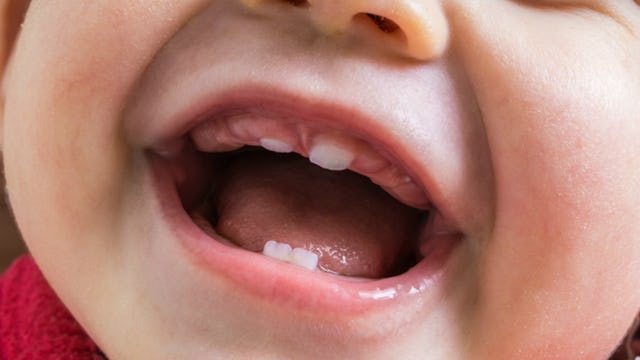Some Newborns Are Born With Teeth

I hope you’re sitting down and have not recently eaten, because this news might make you a little, ummm, queasy. Okay, here goes: it turns out that some babies are both with … wait for it … TEETH.
I mean real, actual pearly whites, sticking out of their gums, when they are born. I’m not making this shit up.
They’re called “natal teeth,” according to The Children’s Hospital of Wisconsin, and while they are rare, as many as 1 in 2,000 babies have them. “Natal teeth are usually the infant’s primary teeth (or baby teeth) that have come in early,” the hospital explains.
Oh, and they are not to be confused with neonatal teeth, i.e., teeth that pop up during the baby’s first month of life. Because apparently that’s a thing too.
If you weren’t gagging already, there’s more. Natal teeth, describes the hospital “are often loose because the root is not completely developed.” As a result, they warn that these teeth can sometimes become dislodged, and there is a risk of a baby swallowing them.
SWALLOWING. TEETH. Are you freaking kidding me?
“Teeth that are loose may need to be removed to decrease the risk of the infant inhaling the tooth into his/her airways,” the hospital says. “This will be decided by your infant’s physician or dentist.”
I mean, as if having a newborn with teeth wasn’t shocking enough, now you have to take your poor newborn to the dentist? That is some serious horror movie-level bullshit there. I truly feel for any mom who has been in this situation.
The hospital also mentions that breastfeeding can be a problem because “the infant may bite the mother.” YIKES. And while it should be noted that breastfed babies who get teeth at a typical developmental time (4-7 months) generally do not usually bite their moms, I would venture to guess that breastfeeding an actual newborn with fangs teeth could pose some issues, especially since moms and babies don’t always have that “deep latching” thing worked out at the very beginning.
Again, I am not making this stuff up. Just ask Jasmin Heasman of Plymouth, Devon in England, whose baby Isla-Rose was born this past summer with a pearly white right there in the center of her bottom gum. As the BBC reported, Isla-Rose’s natal tooth had to be removed at just 12 days old, and the whole experience was totally disorienting and unnerving for the wee girl’s parents.
“She had to have it taken out as it was wobbly,” Jasmin told the BBC, noting that she “never expected” to be taking her young daughter to the dentist.
The Seven Trees Dental Access Centre, where baby Isla-Rose had her tooth removed, said that she was their youngest patient to date. Isla-Rose was too young to get any anesthetic, but was given some numbing cream for the pain (and a sticker too, because you can’t leave the dentist without a sticker).
Jasmin said that the whole procedure was harder for her to handle than her daughter. “She was braver than me, she didn’t really cry,” she remarked. “I had to go out of the room crying because I couldn’t stand seeing my princess in pain.”
Oh my goodness, I feel for this mother. There is no way I could handle the freaking tooth extraction of my newborn without a shot of laughing gas … you know, if the dentist had any handy.
Oddly, if your baby is one of the (un)lucky ones to have their natal tooth extracted, they will not end up growing a baby tooth in that spot during teething time. Dr. Homa Amini, professor of clinical pediatric dentistry at The Ohio State University College of Dentistry, explains to LiveScience that you would have to wait until your kiddo sprouts an adult tooth in that spot at 6 or 7 years old.
However, even though they will end up with a gap, it’s nothing to worry about, says Dr. Amini. “[I]t’s not a problem. They just don’t have a tooth down there,” he said, adding that “[n]othing has been reported as causing long-term problems.”
Whew. Thank goodness for that.
In general, while totally bonkers and freaky, there is nothing unhealthy or worrisome about natal teeth unless they pose a choking risk to your baby, are interfering with feeding, or otherwise hurting your baby in any way. It goes without saying, of course, that all babies with abnormalities such as these should be seen by a doctor for further advice and a complete examination.
This article was originally published on